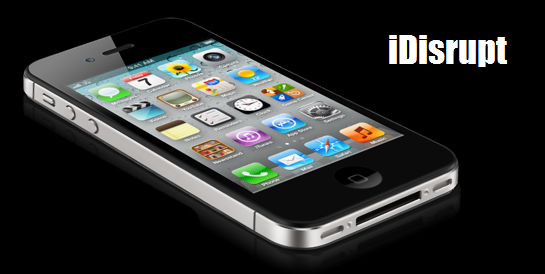A Mutable Log
A blog by Devendra Tewari
Project maintained by tewarid Hosted on GitHub Pages — Theme by mattgraham
Businesses disrupted by smartphones
Here’s my list of some businesses that a smartphone has disrupted or is disrupting, in no particular order. The potential to disrupt several other businesses is huge, so is the opportunity for incumbents to adopt the smartphone before more agile startups disrupt their business.

Portable gaming devices
Most smartphones have sufficiently high-end graphics performance. Game developers have flocked in droves to build dedicated titles for them. The financial woes of the likes of Nintendo and Sony in the gaming department attest to this fact. I see the innovation in 3D gaming devices such as Nintendo 3DS but the cost and lack of titles is a dampener.
E-book readers
I do most of my casual reading on my smartphone. I am slowly adopting my smartphone for serious reading. As a developer, I am well served. Most technical publishers now provide titles in the EPUB format which adapts fairly well to small screens. I have bought books from Apress, O’Reilly and others in the recent past, they provide e-books in multiple formats - PDF, EPUB and MOBI in particular. I store these e-books in a cloud storage service like Dropbox and open them in the appropriate reading app when needed.
Digital cameras
I don’t carry one when I travel. My smartphone has become an apt substitute. Instagram, Google+ and Facebook have photos as their main target for social sharing, digital cameras just cannot keep up. Most smartphones also capture decent HD video.
Document scanning
With high-resolution auto-focus lenses and intelligent graphics processing, apps are able to scan documents really well. I just scan and keep my documents in an app such as the TurboScan and view, e-mail or share it from there.
Desktop printing
Why print if you can take the document everywhere? Commercial airlines now allow you to board flights using on-screen boarding passes.
Personal Computers
I need one as a developer or for sites that are not mobile ready, otherwise I would abandon my PC in a second. Most of my daily activities like reading or sending e-mail, time tracking, personal finance, banking etc are realized on my smartphone.
Digital calculators
You can get all kinds of scientific and financial calculator apps for your smartphone. The arrival of cheap laptops and netbooks began this disruption, the smartphone with its portability is completing it.
Dedicated media players
Most smartphones can play offline or streaming music. Living in Brazil does make taking a high-end smartphone for a walk or jog risky business, hence I do have use for a cheaper music player. If you are streaming your media using apps from Amazon, Google, Netflix, Vevo and the like, a dedicated player is next to useless. You can also get your streaming media onto a bigger screen using HDMI adapters. This may disrupt broadcast TV some day. I don’t remember the last time I watched TV.
GPS devices
Dedicated GPS devices are slowly becoming niche devices. Most smartphones have built-in GPS and apps for turn-by-turn navigation. They can also record your route so that you can retrace you steps during biking and hiking trips.
Electronic payment
This is one disruption that has just begun. Sellers can buy simple credit card readers and attach them to a smartphone and charge their customers anywhere in their establishment. No more going to a PoS terminal. The smartphone could one day make credit cards obsolete.
Consumer data storage devices
There was a time when I upgraded my computer hard-disk every two years or so. I haven’t done that in five years. With most of my media creation happening on the smartphone I can upload that media to a number of cloud storage options. I still don’t rely on them a hundred percent and they have features that are sometimes a bother, but we are steadily getting there.
The radio
Most broadcast radio now also streams over the internet. I don’t have a FM radio player at home. I do have one in the car but I do my listening on the smartphone using dedicated apps. Smartphones did not disrupt the radio obviously, but smartphones are disrupting whatever dedicated radio hardware still sells.